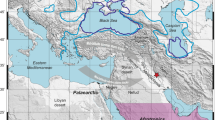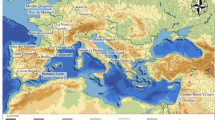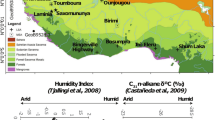Abstract
THE most recent book on African prehistory by Mile. H. Alimen1 continues to adopt the theory of three pleistocene pluvials and two interpluvials. Her field-work having been mainly in the Sahara, this must be taken as her considered interpretation of phenomena in this part of Africa.
This is a preview of subscription content, access via your institution
Access options
Subscribe to this journal
Receive 51 print issues and online access
$199.00 per year
only $3.90 per issue
Buy this article
- Purchase on Springer Link
- Instant access to full article PDF
Prices may be subject to local taxes which are calculated during checkout
Similar content being viewed by others
References
“Préhistoire de l'Afrique” (see especially, pp. 173, 234).
“Olduvai Gorge”; “Study of Pleistocene Climatic Changes in North-East Angola”.
For example, Problèmes d'Afrique centrale, 18, 9 (1952).
C.R Second Panafrican Congress on Prehistory, 293.
ibid., p. 259; Notes africaines, p. 65 (1954); and several papers not yet published.
South African J. Sci., 277 (1955).
van Woerkom, in Shapley, “Climatic Change”, 147.
Author information
Authors and Affiliations
Rights and permissions
About this article
Cite this article
DAVIES, O. African Pleistocene Pluvials and European Glaciations. Nature 178, 757–758 (1956). https://doi.org/10.1038/178757b0
Issue Date:
DOI: https://doi.org/10.1038/178757b0
Comments
By submitting a comment you agree to abide by our Terms and Community Guidelines. If you find something abusive or that does not comply with our terms or guidelines please flag it as inappropriate.



